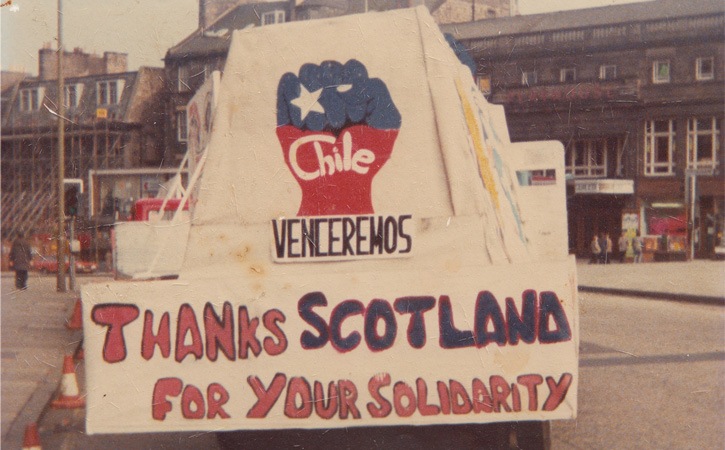Frank Rowley writes on ‘Nae Pasaran’ and the working class internationalism of Scottish factory workers in during the times of Pinochet’s military dictatorship in Chile
Individualism, the ‘dog-eat-dog‘ mindset is endemic to the working class in all areas of their lives. This is fact.
Today it is taken as such a certainty (from lifetimes of ruling class indoctrination from every angle) that it, along with ever other unique quality of 21st Century life, is considered natural.
“It’s always been this way.” But this was not always the case, and it cannot stay this way.
‘Nae Pasaran’, above all, proves that internationalism and working class solidarity not only go hand-in-hand, but are necessary to fighting capitalism effectively.
Nae Pasaran is a 2018, hour-and-a-half documentary about about a group of workers at a Rolls-Royce factory in East Kilbride, Scotland, who refused to work on Chilean Air Force parts from 1974-78 due to the atrocities carried out in Chile by the Pinochet dictatorship.
The film was broadcast on the BBC Scotland channel on 21 November 2020 and is currently still available on BBC iPlayer.
The film serves as both a condemnation of the fascist coup of Pinochet, the US-UK ruling classes in their collaboration with (and engineering of) it and a celebration of industrial trade unionism, particularly of the period just before neoliberalism, at the last half of the 1970s.
The Scottish workers blocked the construction and transport of the Rolls-Royce engines needed for the Hawker Hunter jets that Chilean Air Force used to bomb to presidential palace and kill Salvador Allende during the coup and generally terrorise any striking workers or protestors opposing Pinochet’s brutal fascist, neoliberal rule.
The key thread here being that the Scottish workers never found out directly the result of their actions, instead acting out of pure class solidarity with their international comrades who were suffering most.
The film’s main appeal is the emotional narrative built around both the (now aged) striking Scottish workers and surviving civil servants and military personal who served under Allende and Pinochet respectively.
What cements the emotional impact is the combination of punchy editing, a soulful score by Patrick Neil Doyle and the intertwining of the interviewee’s fates. The Scottish workers have a magnetism to each other that workers of that time could easily cultivate compared to now. The Chilean survivors all tell their stories with the deep mental scars they suffered brought to the surface, no holds-barred.
Said magnetism is more understandable considering they were old enough to have fought in WWII and so were more accustomed to the mutual suffering and cooperation required of them as a generation.
Trade unionism as a whole was still a respected British institution for workers at that time and, critically, was still headed by Communists in many senior positions.
Their ‘trade union consciousness’ along with physical organisations into unions with shop floor representatives allowed them to take their disgust at the coup to the level of a physical action, even if it is shown that their union management later broke their solidarity with the workers and ordered them to allow the engines to be transported (which they didn’t).
A bonus appeal for those already aware of the Allende coup is both the beautifully restored colour footage of the event itself and the interviews with the survivors, all of who are in their old age and carry with them the oral history of the event, the extent of it’s barbarity having been sponged from history after the mass burning of Chilean military documents of the coup just before they were to be declassified.
It is rather fortunate that the director, a Chilean-Belgian refugee of the coup himself, decided to interview them when he did. At least three of the Chilean survivors died in the making of the film and one of the Scottish workers had to have his son represent him on camera posthumously. If he had waited much longer, we may have lost this vital piece of working class and Socialist history forever.
LESSONS
Allende’s lesson to Communists and Socialists is that a revolution that doesn’t arm the people and organise them into a militia to defend their gains, whether it is won through the ballot box or not, will always fail.
Pinochet’s lesson is that Fascism didn’t stop in 1945, it is always one step away.
The Scottish workers’ lesson is that internationalism, working class solidarity and industrial trade unionism are all necessary at once to combat capitalism head-on.
Frank Rowley, is a member of the YCL’s Kent Branch
- Official Website – https://naepasaran.com/
- Original Short Film – https://www.scottishdocinstitute.com/films/nae-pasaran-short/



